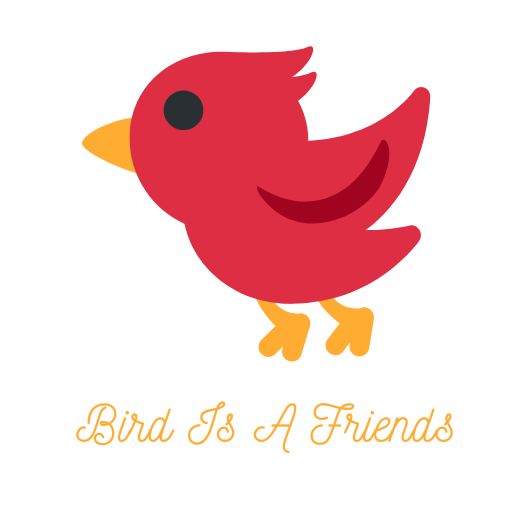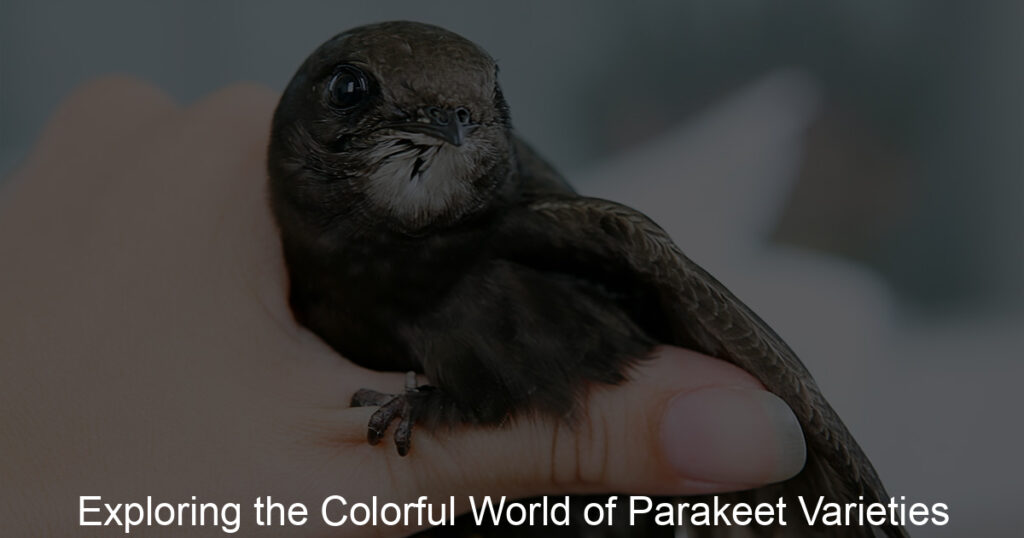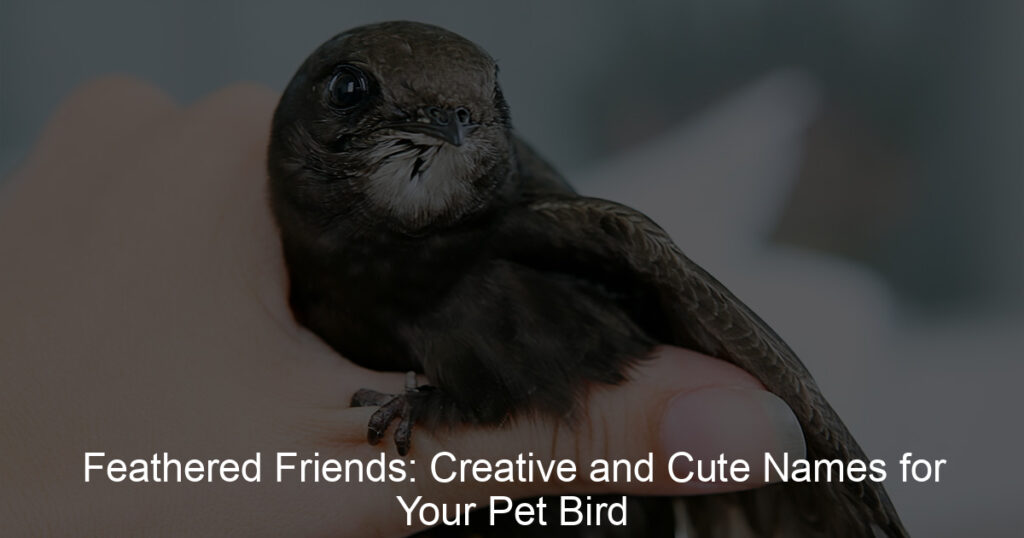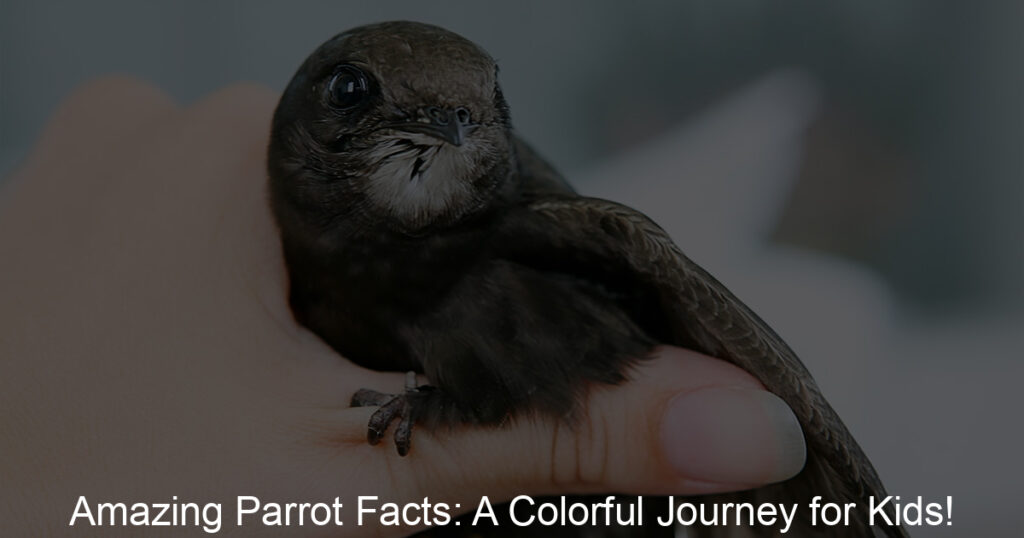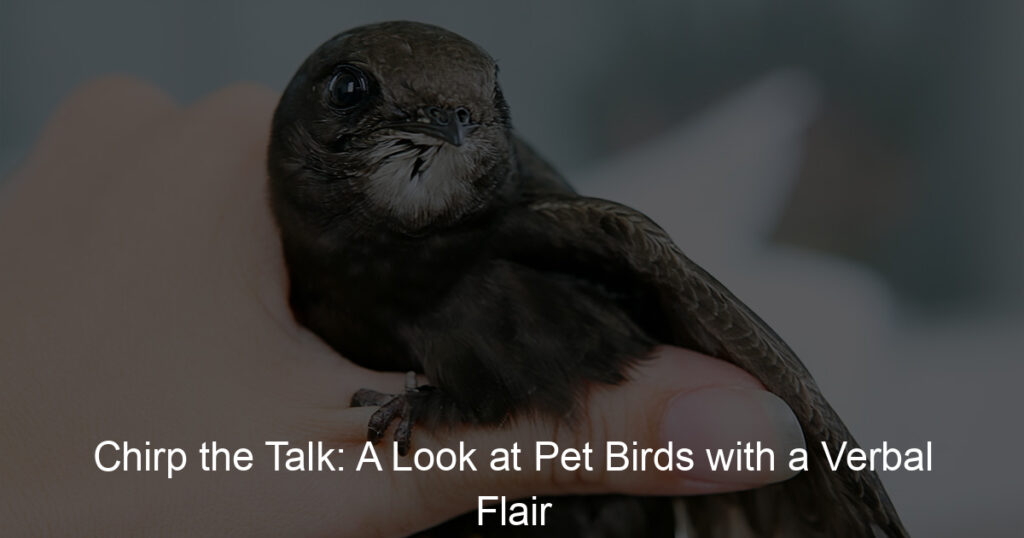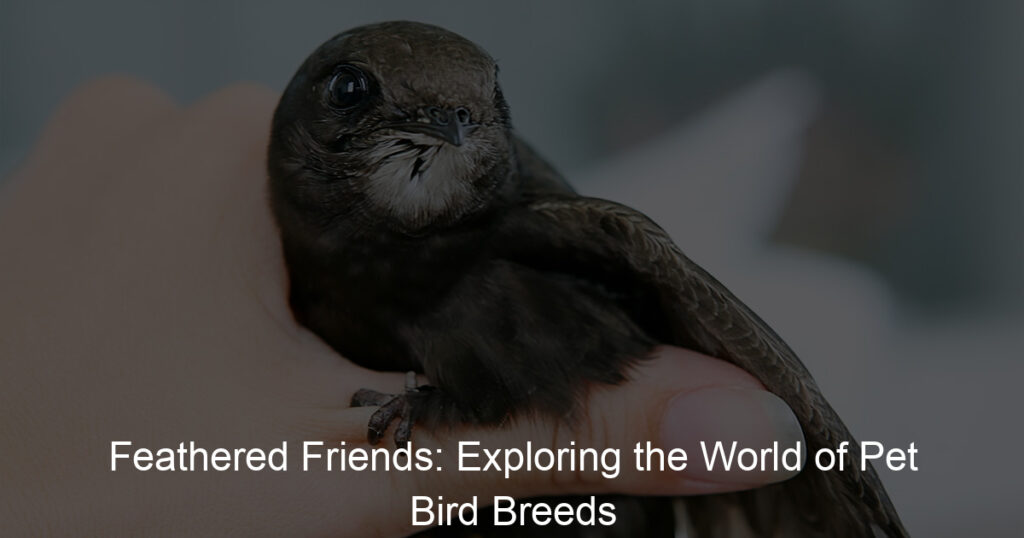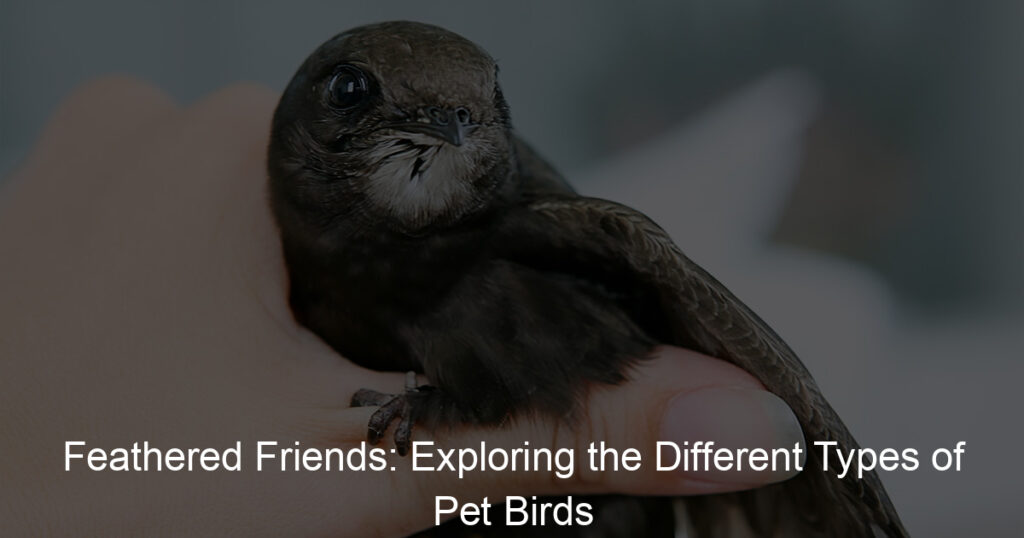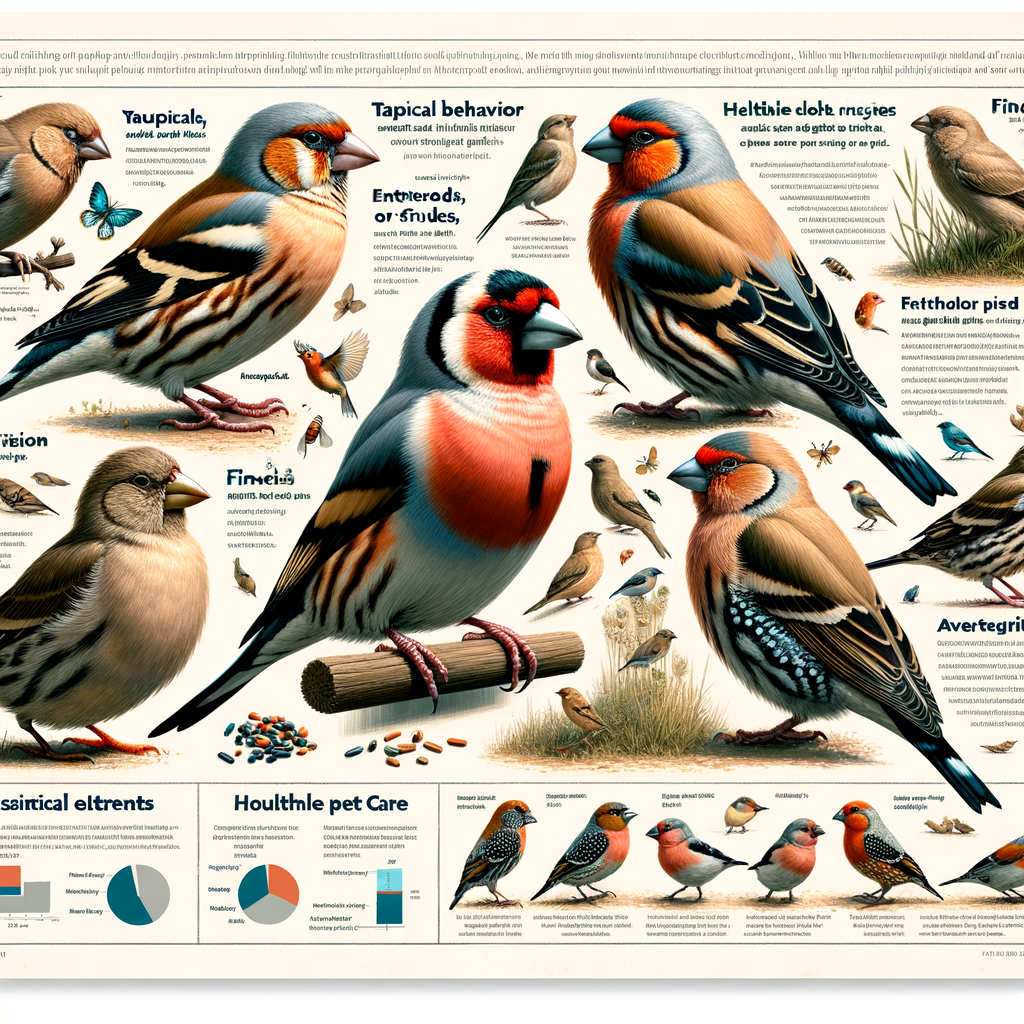
Introduction to Finches
Finches are small to medium-sized birds that are known for their vibrant colors and melodious songs. They are popular as pets due to their lively nature and easy care. In this section, we will explore the different species of finches, understand their behavior, and learn about their lifespan.
- Overview of Finch Species
- Understanding Finch Behavior
- Finch Lifespan
There are several species of finches, each with its unique characteristics. Some of the most popular ones include:
| Species | Color | Size |
|---|---|---|
| Zebra Finch | Black and white stripes | Small |
| Goldfinch | Yellow and black | Medium |
| House Finch | Red and brown | Medium |
Finches are social birds that enjoy the company of their own kind. They are active during the day and love to fly and hop around. They communicate through a series of chirps and songs. Finches are also known for their nest-building skills. They use twigs, grass, and feathers to build their nests.
The lifespan of a finch depends on its species and the care it receives. In general, finches live for about 5 to 10 years. However, with proper care and nutrition, some finches can live up to 15 years. It’s important to provide them with a balanced diet, clean water, and a safe environment to ensure they live a long and healthy life.
Finch Care Guide
When it comes to bird pets, finches are a popular choice due to their vibrant colors and lively behavior. However, like any pet, they require proper care and attention. This guide will provide you with the necessary information to ensure your finch lives a healthy and happy life.
Preparing for a Finch
Before you bring a finch into your home, there are a few key things you need to consider:
- Choosing the right Finch species: There are several species of finches, each with their own unique characteristics and needs. For example, the Zebra Finch is known for its playful nature and beautiful patterns, while the Gouldian Finch is admired for its vibrant colors. It’s important to research and choose a species that fits well with your lifestyle and preferences.
- Understanding the commitment: Finches can live up to 10 years with proper care, so owning one is a long-term commitment. They require daily feeding, regular cage cleaning, and plenty of social interaction. Additionally, finches are social birds that thrive in pairs or small groups, so you may need to consider getting more than one.
Preparing for a finch is not just about buying the necessary supplies. It’s about understanding the responsibility that comes with owning a pet and being ready to provide the care and attention it needs. With the right preparation, you can ensure your finch has a comfortable and fulfilling life.
Finch Diet
Understanding the dietary needs of your finch is crucial to its health and happiness. Let’s delve into the essential nutrients, feeding schedules, and safe and harmful foods for finches.
- Essential Nutrients for Finches
Finches require a balanced diet to thrive. This includes:
- Proteins: Found in foods like eggs, insects, and legumes. They help in growth and repair of body tissues.
- Carbohydrates: Found in grains and fruits. They provide energy for daily activities.
- Fats: Found in seeds and nuts. They are a concentrated source of energy.
- Vitamins and Minerals: Found in fruits, vegetables, and supplements. They support various body functions.
- Feeding Schedule and Portion Sizes
Finches typically eat twice a day, once in the morning and once in the evening. The portion size should be about a tablespoon of seed mix per bird. Fresh fruits and vegetables can be offered daily, but should be removed after a few hours to prevent spoilage. Always ensure fresh water is available.
- Safe and Harmful Foods
Finches enjoy a variety of foods, but not all are safe. Here’s a quick guide:
| Safe Foods | Harmful Foods |
|---|---|
| Seeds, fruits, vegetables, cooked eggs, legumes | Avocado, chocolate, caffeine, alcohol, salty or sugary foods |
Remember, a balanced diet is key to a healthy, happy finch. Always consult with a vet or a bird care expert if you’re unsure about a particular food.
Finch Habitat
When it comes to caring for your finch, one of the most important aspects is creating a suitable habitat. This involves creating a safe and comfortable environment and providing essential cage accessories. Let’s dive deeper into these aspects.
-
Creating a Safe and Comfortable Environment
Creating a safe and comfortable environment for your finch is crucial. Finches are delicate birds that need a peaceful and secure environment to thrive. The cage should be placed in a quiet, low-traffic area of your home, away from direct sunlight and drafts. The temperature should be kept between 65 and 75 degrees Fahrenheit. It’s also essential to keep the cage clean to prevent disease. Regularly remove any waste and uneaten food, and clean the cage thoroughly once a week with bird-safe disinfectant.
-
Essential Cage Accessories
Equipping your finch’s cage with essential accessories is another key aspect of creating a suitable habitat. Here are some of the most important items:
- Perches: Finches need perches of different sizes and textures to exercise their feet. Avoid using sandpaper-covered perches as they can harm your bird’s feet.
- Food and Water Dishes: Provide separate dishes for food and water. These should be cleaned daily to prevent bacterial growth.
- Swings and Toys: Finches are active birds and enjoy toys and swings. These provide mental stimulation and physical exercise.
- Nesting Box: If you have a pair of finches, providing a nesting box will give them a place to lay eggs and raise their young.
Remember, the cage should be spacious enough to accommodate these accessories without crowding the birds. A crowded cage can lead to stress and health issues in finches.
Finch Health Issues
Finches, like any other pet, can experience health issues. It’s important to recognize the signs of common health problems and know when to seek veterinary care. Here, we’ll discuss some of these issues and provide guidance on how to handle them.
Common Health Problems
Finches can suffer from a variety of health problems. Some are minor and can be treated at home, while others require professional veterinary care. Let’s take a look at some common health issues and how to recognize them.
- Recognizing signs of illness
- When to seek veterinary care
Finches are good at hiding their illnesses, so it’s important to know the signs. A sick finch may become less active, lose its appetite, or start losing feathers. It might also have difficulty breathing, or it might sit at the bottom of the cage instead of perching. If you notice any of these signs, it’s important to take action immediately.
If your finch shows signs of illness, it’s always a good idea to consult a vet. Even if the symptoms seem minor, they could be a sign of a serious problem. If your finch has difficulty breathing, is losing a lot of weight, or is not eating or drinking, you should seek veterinary care right away. Remember, it’s always better to be safe than sorry when it comes to your pet’s health.
Understanding your finch’s health issues is crucial for their well-being. By recognizing the signs of common health problems and knowing when to seek veterinary care, you can ensure that your finch lives a long, healthy, and happy life.
Preventive Care
Preventive care is a crucial aspect of maintaining your finch’s health. It involves two main components: regular check-ups and a balanced diet.
- Regular Check-ups
Just like humans, finches need regular check-ups to ensure they are healthy. These check-ups can help identify any potential health issues before they become serious. A veterinarian who specializes in birds should perform these check-ups at least once a year.
During a check-up, the vet will examine your finch’s feathers, beak, eyes, and overall body condition. They will also listen to your bird’s heart and lungs. This is a great time to ask any questions you may have about your finch’s health or behavior.
- Importance of a Balanced Diet
Feeding your finch a balanced diet is another important aspect of preventive care. A well-balanced diet can help your finch stay healthy and live a long life.
Finches should eat a diet that includes a variety of seeds, fruits, and vegetables. They also need access to clean, fresh water at all times. Avoid feeding your finch foods that are high in fat or sugar, as these can lead to health problems.
Remember, each finch is unique and may have different dietary needs. It’s always a good idea to consult with a vet to determine the best diet for your specific bird.
In conclusion, preventive care is key to ensuring your finch stays healthy. By scheduling regular check-ups and providing a balanced diet, you can help your finch live a long and happy life.
Buying a Finch
When it comes to buying a finch, there are two main areas to focus on. Firstly, you need to choose a reputable breeder or pet store. Secondly, you need to know what to look for in a healthy finch. Let’s delve into these two areas.
- Choosing a reputable breeder or pet store
- What to look for in a healthy Finch
Choosing where to buy your finch is a crucial step. A reputable breeder or pet store will ensure that the finches have been well cared for and are healthy. They should be knowledgeable about finches and able to answer any questions you may have. They should also provide a clean and comfortable environment for the birds.
One way to find a reputable breeder or pet store is by asking for recommendations from other finch owners or veterinarians. You can also look for reviews online. Remember, a good breeder or pet store will prioritize the health and wellbeing of their birds over making a quick sale.
Knowing what to look for in a healthy finch is equally important. A healthy finch should be active and alert, with bright eyes and smooth feathers. They should not show any signs of illness, such as lethargy, loss of appetite, or changes in their droppings.
It’s also important to observe the bird’s behavior. A healthy finch should be social, chirping and interacting with other finches. They should also be comfortable in their environment, not showing signs of stress or fear.
Here’s a quick checklist to help you identify a healthy finch:
| Signs of a Healthy Finch |
|---|
| Active and alert |
| Bright eyes |
| Smooth feathers |
| Good appetite |
| Social behavior |
By following these guidelines, you can ensure that you’re making the best decision when buying a finch. Remember, a healthy bird is a happy bird!
Finch Pet Care
When it comes to pet care, finches require a unique approach. This section will guide you through the process of training your finch and understanding their behavior, which is crucial for their well-being.
Training Your Finch
Training your finch can be a rewarding experience, but it requires patience and understanding. Here are some effective training techniques and insights into finch behavior to help you along the way.
- Effective Training Techniques
- Understanding Finch Behavior
Finches are intelligent birds and can be trained using positive reinforcement. This involves rewarding good behavior with treats or praise, which encourages the bird to repeat the behavior. Start with simple commands like stepping up onto your finger. Always remember to be patient and consistent with your training sessions.
Understanding your finch’s behavior is key to successful training. Finches are social birds and enjoy being in groups. They communicate through a variety of chirps and songs. If your finch is fluffing its feathers, it could be a sign of contentment. However, if it’s hiding or not eating, it could indicate stress or illness. Observing and understanding these behaviors can help you provide the best care for your finch.
Training your finch and understanding their behavior is a critical part of pet care. With patience, consistency, and a keen eye for their unique behaviors, you can ensure your finch is happy, healthy, and well-adjusted.
Interacting with Your Finch
Interacting with your finch is a crucial part of pet care. It involves understanding their social needs and learning safe handling practices. Let’s delve into these aspects.
- Social Needs of Finches
Finches are social birds. They thrive in the company of their kind. In the wild, they live in large flocks, and this social nature carries over when they are kept as pets. If you have a single finch, it may feel lonely and stressed, which can lead to health issues. Therefore, it’s recommended to keep at least two finches together.
They enjoy interacting with each other, chirping, and flying around. Providing a spacious cage with perches at different heights can help them feel more at home. Toys can also be a great addition to their environment, as they stimulate their minds and keep them active.
- Safe Handling Practices
Finches are delicate creatures, and handling them requires care. Unlike some pets, they are not fond of being held or petted. In fact, unnecessary handling can cause them stress. It’s best to interact with your finch by talking to them gently and observing them.
However, there may be times when you need to handle your finch, such as during a health check or cage cleaning. In these instances, it’s important to be gentle and quick to minimize stress. Always wash your hands before and after handling your finch to prevent the spread of germs.
| Key Points | Details |
|---|---|
| Social Needs | Finches are social birds and do best in pairs or groups. Provide a spacious cage with perches and toys. |
| Handling Practices | Minimize handling to reduce stress. When necessary, handle gently and quickly. Always wash hands before and after. |
In conclusion, understanding the social needs of your finch and practicing safe handling are key to a happy and healthy pet. Remember, every finch is unique and may require different levels of interaction. Pay attention to their behavior to understand their individual needs and preferences.
Conclusion
As we wrap up our comprehensive guide on finches, let’s take a moment to recap the essential knowledge we’ve gathered and share some final thoughts on adopting a finch.
- Recap of essential Finch care knowledge
- Final thoughts on adopting a Finch
Finches are delightful pets that require a certain level of care. They thrive in a spacious cage with plenty of room to fly around. Their diet should be balanced and nutritious, consisting of seeds, fruits, and vegetables. Regular cleaning of their habitat is crucial to prevent health issues. Also, remember that finches are social birds and prefer to live in pairs or small groups.
Adopting a finch is a commitment that should not be taken lightly. These birds can live up to 10 years, so you should be prepared for a long-term responsibility. They bring joy and liveliness to a home with their vibrant colors and melodious songs. However, they also require time, attention, and resources to ensure their well-being. If you are ready to provide these, a finch can be a wonderful addition to your family.
In conclusion, finches are charming pets that can bring a lot of happiness into your life. With the right care and attention, they can thrive and fill your home with their delightful songs. We hope this guide has provided you with valuable insights into finch care and adoption. Remember, the key to a happy finch is a caring and attentive owner.
